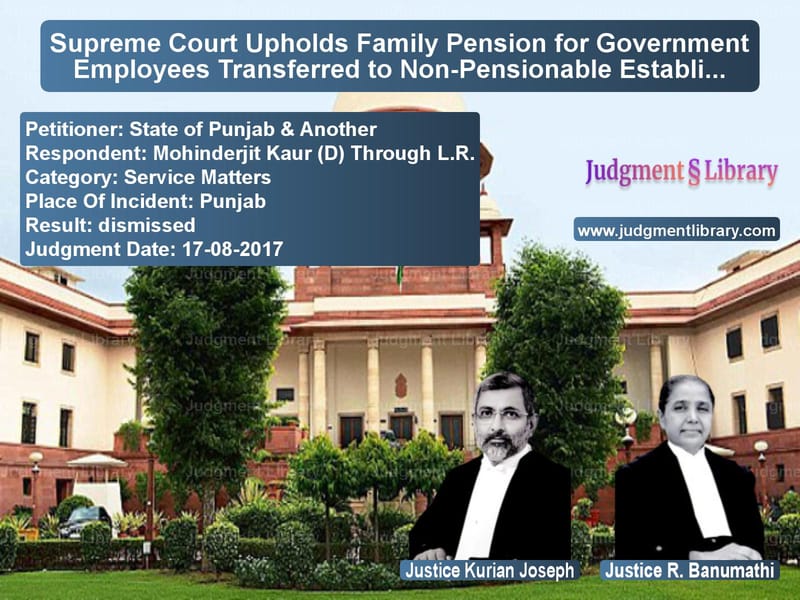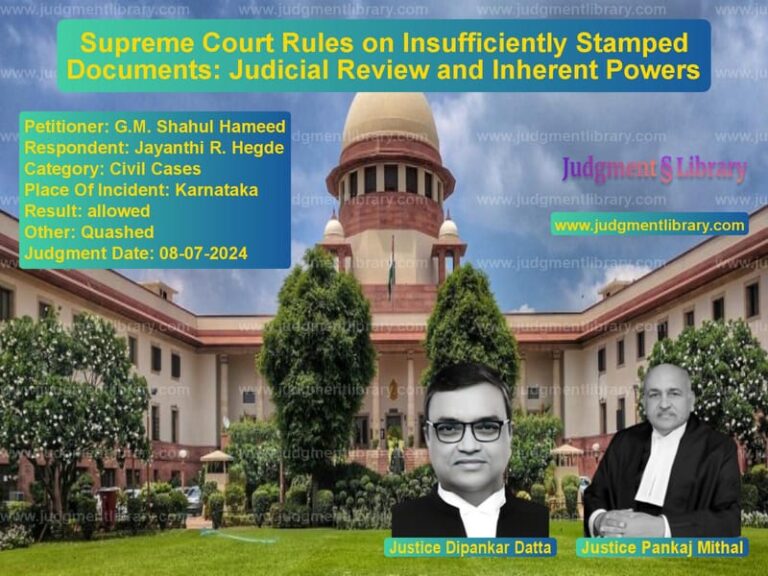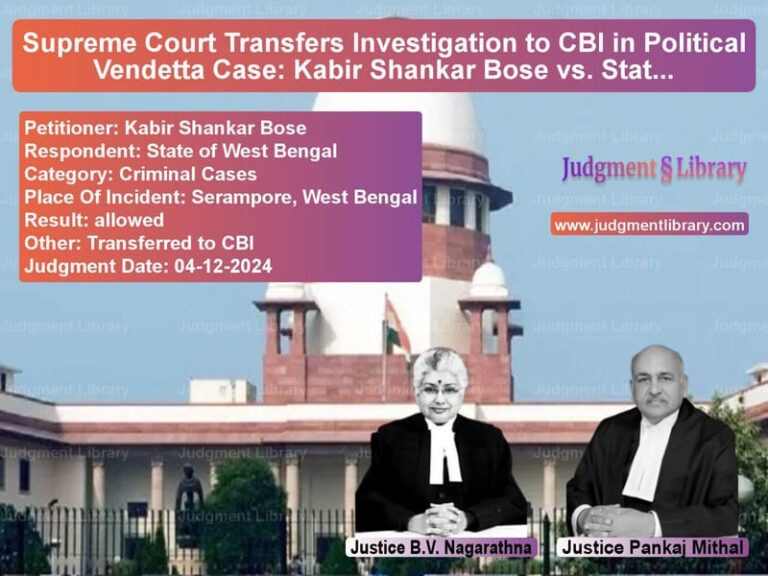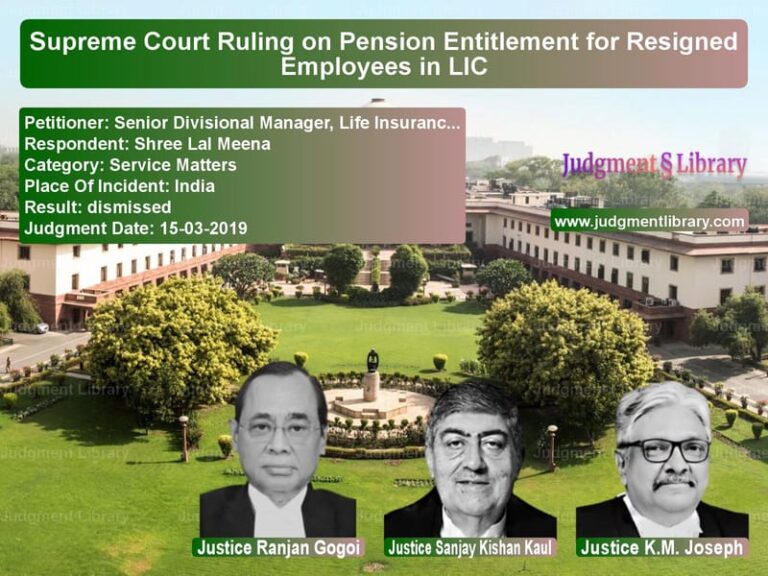Supreme Court Upholds Family Pension for Government Employees Transferred to Non-Pensionable Establishments
The case of State of Punjab & Another v. Mohinderjit Kaur (D) Through L.R. revolved around the entitlement of family pension for government employees who were transferred to non-pensionable establishments. The Supreme Court upheld the High Court’s decision that such employees were still entitled to family pension under the Punjab Service Rules.
Background of the Case
The dispute arose when the State of Punjab denied family pension benefits to employees transferred to non-pensionable establishments. The affected employees argued that they were covered under Rule 5.3 of the Punjab Service Rules and, therefore, should receive family pension benefits. The Punjab and Haryana High Court ruled in favor of the employees, prompting the State of Punjab to appeal before the Supreme Court.
Key Legal Issues
- Whether government employees transferred to non-pensionable establishments are entitled to family pension under Rule 5.3 of the Punjab Service Rules.
- Whether the proviso under Rule 5.3(3) exempts the government from liability to pay family pension in such cases.
- Whether the Family Pension Scheme, 1964, applies to employees transferred to non-pensionable establishments.
Arguments by the Parties
Petitioners’ Arguments (State of Punjab)
The State of Punjab contended that:
- Employees transferred to non-pensionable establishments were not entitled to family pension as per the proviso under Rule 5.3(3).
- The government had been exempted from the liability of paying family pension in such cases.
- Family pension was only applicable to employees in pensionable establishments.
Respondents’ Arguments (Mohinderjit Kaur & Others)
The respondents argued that:
- Rule 5.3 did not exclude employees transferred to non-pensionable establishments from receiving family pension.
- The Family Pension Scheme, 1964, applied to all government employees, including those transferred to non-pensionable establishments.
- The government could not deny family pension benefits once an employee had opted for pension benefits under Rule 5.3(2)(a).
Supreme Court’s Judgment
The Supreme Court, comprising Justices Kurian Joseph and R. Banumathi, upheld the High Court’s decision, ruling in favor of the employees.
“Nowhere under the Family Pension Scheme is there a provision carving out the class of pensioners in receipt of monthly pension so as to deny the benefit of family pension. The Scheme having granted the benefit of family pension to such pensioners, the proviso, even assuming it applies to everybody, under the general rules cannot take away the benefit since the Family Pension Scheme is a special benefit granted to the pensioners.”
The Court emphasized that:
- The Family Pension Scheme, 1964, was applicable to all government employees, including those who had been transferred to non-pensionable establishments.
- There was no legal provision excluding such employees from receiving family pension.
- The government’s interpretation of Rule 5.3(3) was incorrect and could not override the benefits provided under the Family Pension Scheme.
Key Legal Observations
- The Family Pension Scheme, 1964, provides benefits to all eligible government employees, including those transferred to non-pensionable establishments.
- Rule 5.3(3) does not exempt the government from paying family pension to employees who opted for pension benefits.
- The government cannot deny family pension benefits without a clear legal provision to that effect.
Final Order
The Supreme Court dismissed the appeals filed by the State of Punjab and ordered the payment of arrears of pension to the respondents within twelve weeks. It further ruled that if the payments were not made within the stipulated time, they would accrue interest at 12% per annum, and the responsible officers would be personally liable for the delay.
Conclusion
This ruling reinforces the rights of government employees transferred to non-pensionable establishments, ensuring that they and their families are entitled to pension benefits. The judgment upholds the principle that family pension is a statutory right that cannot be arbitrarily denied by the government.
Don’t miss out on the full details! Download the complete judgment in PDF format below and gain valuable insights instantly!
Download Judgment: State of Punjab & An vs Mohinderjit Kaur (D) Supreme Court of India Judgment Dated 17-08-2017.pdf
Direct Downlaod Judgment: Direct downlaod this Judgment
See all petitions in Pension and Gratuity
See all petitions in Public Sector Employees
See all petitions in Employment Disputes
See all petitions in Judgment by Kurian Joseph
See all petitions in Judgment by R. Banumathi
See all petitions in dismissed
See all petitions in supreme court of India judgments August 2017
See all petitions in 2017 judgments
See all posts in Service Matters Category
See all allowed petitions in Service Matters Category
See all Dismissed petitions in Service Matters Category
See all partially allowed petitions in Service Matters Category







